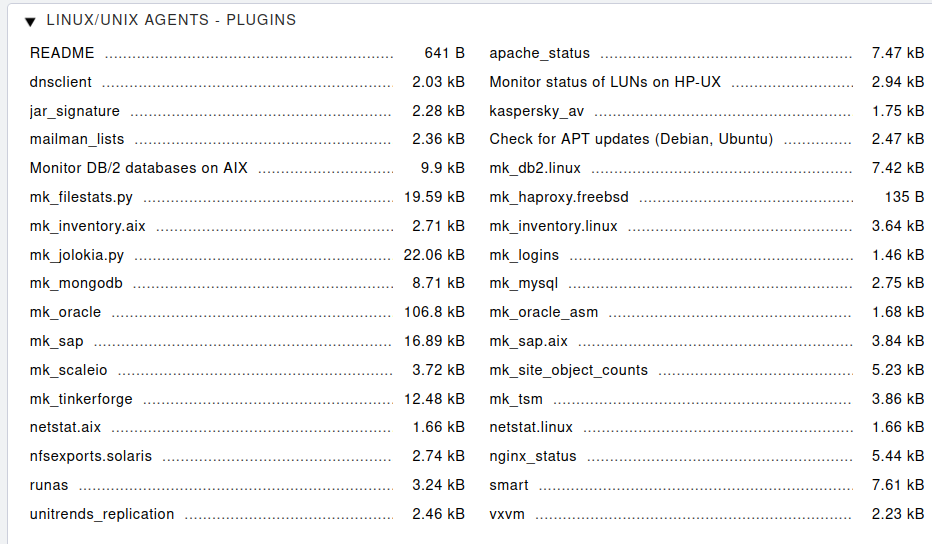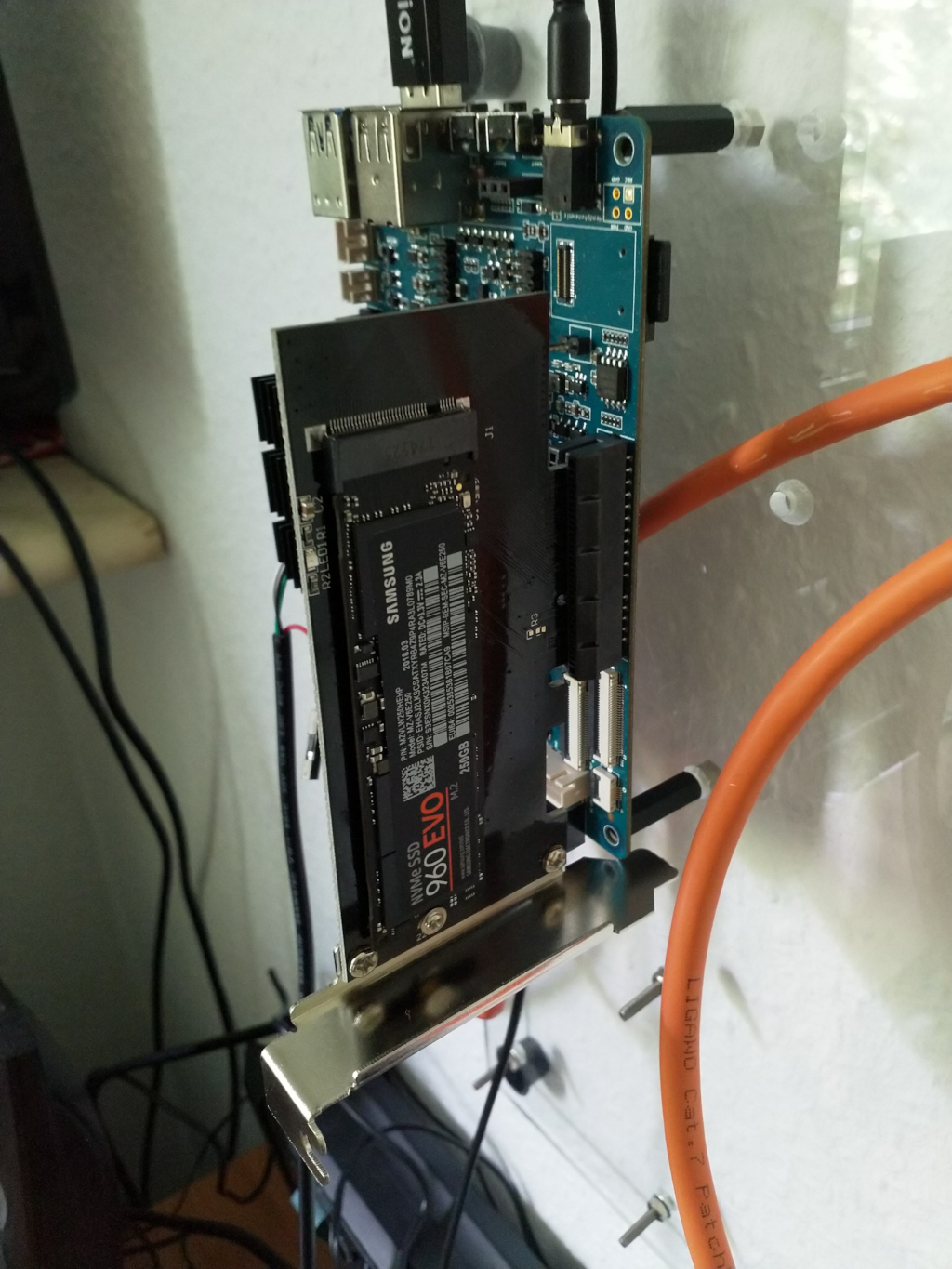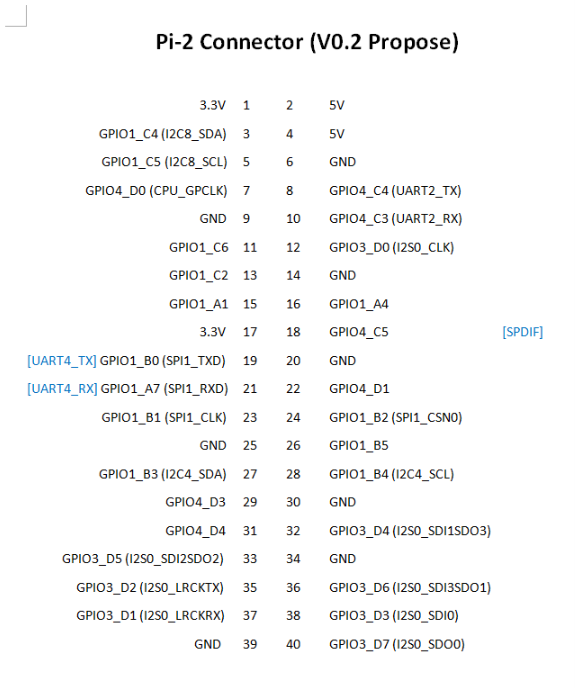ROCKPro64 - PCIe NVMe SSD installieren
-
Hardware
- ROCKPro64
- PCIe NVMe SSD Adapater
- beliebige NVMe SSD
Software
Software installieren
Der einfachste Weg ist, den PCIe NVMe Adapter in einen anderen PC zu stecken. Ich habe da ja was hier rumstehen
 Der PC hat ein Debian Buster 10 drauf. Karte rein, Image runterladen und mit dem Schreiber von Laufwerksabbildern auf die NVMe SSD bügeln. Dazu habe ich vorher das Image ausgepackt.
Der PC hat ein Debian Buster 10 drauf. Karte rein, Image runterladen und mit dem Schreiber von Laufwerksabbildern auf die NVMe SSD bügeln. Dazu habe ich vorher das Image ausgepackt.unxz buster-minimal-rockpro64-0.9.16-1163-arm64.img.xzHardware installieren
Danach die Karte in den ROCKPro64 einbauen. Damit der ROCKPro64 jetzt von der NVMe SSD bootet, brauchen wir im SPI Speicher einen uboot. Dazu setze ich momentan den uboot von Sigmaris ein.
Eine Anleitung dazu findet ihr hier.
Der Start
Nach dem Start fragt er ja erst mal das neue Passwort ab.
rank@debian:~$ ssh rock64@192.168.178.29 The authenticity of host '192.168.178.29 (192.168.178.29)' can't be established. ECDSA key fingerprint is SHA256:MLxSpWMhjYQ5FpnA8ZzFUYIodN4JfXJLKMulhKFzBOM. Are you sure you want to continue connecting (yes/no)? yes Warning: Permanently added '192.168.178.29' (ECDSA) to the list of known hosts. rock64@192.168.178.29's password: You are required to change your password immediately (administrator enforced) _ __ _ _ _ __ ___ ___| | ___ __ _ __ ___ / /_ | || | | '__/ _ \ / __| |/ / '_ \| '__/ _ \| '_ \| || |_ | | | (_) | (__| <| |_) | | | (_) | (_) |__ _| |_| \___/ \___|_|\_\ .__/|_| \___/ \___/ |_| |_| Linux rockpro64 4.4.197-1236-rockchip-ayufan-g30faab37e339 #1 SMP Tue Oct 22 11:35:10 UTC 2019 aarch64 The programs included with the Debian GNU/Linux system are free software; the exact distribution terms for each program are described in the individual files in /usr/share/doc/*/copyright. Debian GNU/Linux comes with ABSOLUTELY NO WARRANTY, to the extent permitted by applicable law. WARNING: Your password has expired. You must change your password now and login again! Changing password for rock64. Current password: New password: Retype new password: passwd: password updated successfully Connection to 192.168.178.29 closed.Danach können wir uns mit dem neuen Passwort anmelden. Um administrative Aufgaben durchzuführen, muss man jetzt ein sudo vorne anstellen. Ich finde das mittlerweile furchtbar. Deswegen bauen wir das jetzt um.
su passwdDamit setzen wir ein Passwort für den Root User. Danach können wir uns jetzt mittels
su -anmelden. Damit wären wir im /root Verzeichnis. Mit
suwürden wir im aktuellen Verzeichnis bleiben. Nun steht euch frei, das Tool sudo zu deinstallieren. Auf Systemen, die von außen erreichbar sind, ist das empfehlenswert. Nun kann ich wieder vernünftig arbeiten

Festplatte
Die NVMe SSD ist ein wenig klein

root@rockpro64:~# df -h Filesystem Size Used Avail Use% Mounted on udev 960M 0 960M 0% /dev tmpfs 193M 7.7M 185M 4% /run /dev/nvme0n1p7 1.9G 1.1G 669M 62% / tmpfs 963M 0 963M 0% /dev/shm tmpfs 5.0M 4.0K 5.0M 1% /run/lock tmpfs 963M 0 963M 0% /sys/fs/cgroup /dev/nvme0n1p6 112M 4.0K 112M 1% /boot/efi tmpfs 193M 0 193M 0% /run/user/1000Wir müssen das Filesystem vergrößern. Dazu hat Kamil ein Script geschrieben, was wir uns ein wenig anpassen und damit das Filesystem vergrößern. Dazu findet man hier meinen Beitrag.
Danach sieht das dann schon besser aus.
root@rockpro64:/usr/local/sbin# ./resize_rootfs.sh Resizing /dev/nvme0n1 (pcie/nvme -- /dev/nvme0n1p7)... + sgdisk -e /dev/nvme0n1 Warning: The kernel is still using the old partition table. The new table will be used at the next reboot or after you run partprobe(8) or kpartx(8) The operation has completed successfully. + sfdisk /dev/nvme0n1 -N7 --force + echo ,+,,, Checking that no-one is using this disk right now ... FAILED This disk is currently in use - repartitioning is probably a bad idea. Umount all file systems, and swapoff all swap partitions on this disk. Use the --no-reread flag to suppress this check. Disk /dev/nvme0n1: 465.8 GiB, 500107862016 bytes, 976773168 sectors Units: sectors of 1 * 512 = 512 bytes Sector size (logical/physical): 512 bytes / 512 bytes I/O size (minimum/optimal): 512 bytes / 512 bytes Disklabel type: gpt Disk identifier: 4252573B-53A6-4918-89A6-7802D8D8031F Old situation: Device Start End Sectors Size Type /dev/nvme0n1p1 64 8063 8000 3.9M Linux filesystem /dev/nvme0n1p2 8064 8191 128 64K Linux filesystem /dev/nvme0n1p3 8192 16383 8192 4M Linux filesystem /dev/nvme0n1p4 16384 24575 8192 4M Linux filesystem /dev/nvme0n1p5 24576 32767 8192 4M Linux filesystem /dev/nvme0n1p6 32768 262143 229376 112M Microsoft basic data /dev/nvme0n1p7 262144 4186111 3923968 1.9G Linux filesystem /dev/nvme0n1p7: New situation: Disklabel type: gpt Disk identifier: 4252573B-53A6-4918-89A6-7802D8D8031F Device Start End Sectors Size Type /dev/nvme0n1p1 64 8063 8000 3.9M Linux filesystem /dev/nvme0n1p2 8064 8191 128 64K Linux filesystem /dev/nvme0n1p3 8192 16383 8192 4M Linux filesystem /dev/nvme0n1p4 16384 24575 8192 4M Linux filesystem /dev/nvme0n1p5 24576 32767 8192 4M Linux filesystem /dev/nvme0n1p6 32768 262143 229376 112M Microsoft basic data /dev/nvme0n1p7 262144 976773134 976510991 465.7G Linux filesystem The partition table has been altered. Calling ioctl() to re-read partition table. Re-reading the partition table failed.: Device or resource busy The kernel still uses the old table. The new table will be used at the next reboot or after you run partprobe(8) or kpartx(8). Syncing disks. + partprobe /dev/nvme0n1 + resize2fs /dev/nvme0n1p7 resize2fs 1.44.5 (15-Dec-2018) Filesystem at /dev/nvme0n1p7 is mounted on /; on-line resizing required old_desc_blocks = 1, new_desc_blocks = 59 The filesystem on /dev/nvme0n1p7 is now 122063873 (4k) blocks long. root@rockpro64:/usr/local/sbin# df -h Filesystem Size Used Avail Use% Mounted on udev 960M 0 960M 0% /dev tmpfs 193M 7.7M 185M 4% /run /dev/nvme0n1p7 459G 1.1G 439G 1% / tmpfs 963M 0 963M 0% /dev/shm tmpfs 5.0M 4.0K 5.0M 1% /run/lock tmpfs 963M 0 963M 0% /sys/fs/cgroup /dev/nvme0n1p6 112M 4.0K 112M 1% /boot/efi tmpfs 193M 0 193M 0% /run/user/1000Erledigt

Nun haben wir ein funktionales Debian Buster 10 auf einer PCIe NVMe SSD und können uns nun anderen Aufgaben zuwenden.
Nicht vergessen, als erstes ein
root@rockpro64:/home# apt update Get:1 http://security.debian.org buster/updates InRelease [65.4 kB] Get:4 http://deb.ayufan.eu/orgs/ayufan-rock64/releases InRelease [1343 B] Get:5 http://security.debian.org buster/updates/non-free Sources [688 B] Get:2 http://cdn-fastly.deb.debian.org/debian buster InRelease [122 kB] Get:6 http://security.debian.org buster/updates/main Sources [108 kB] Get:7 http://security.debian.org buster/updates/main arm64 Packages [186 kB] Get:8 http://security.debian.org buster/updates/main Translation-en [100 kB] Get:9 http://security.debian.org buster/updates/non-free Translation-en [344 B] Get:3 http://cdn-fastly.deb.debian.org/debian buster-updates InRelease [49.3 kB] Get:10 http://deb.ayufan.eu/orgs/ayufan-rock64/releases Packages [199 kB] Get:11 http://cdn-fastly.deb.debian.org/debian buster/non-free Sources [86.3 kB] Get:12 http://cdn-fastly.deb.debian.org/debian buster/main Sources [7832 kB] Get:13 http://cdn-fastly.deb.debian.org/debian buster/main arm64 Packages [7737 kB] Get:14 http://cdn-fastly.deb.debian.org/debian buster/main Translation-en [5970 kB] Get:15 http://cdn-fastly.deb.debian.org/debian buster/main arm64 Contents (deb) [35.3 MB] Get:16 http://cdn-fastly.deb.debian.org/debian buster/contrib arm64 Contents (deb) [82.7 kB] Get:17 http://cdn-fastly.deb.debian.org/debian buster/non-free arm64 Packages [53.9 kB] Get:18 http://cdn-fastly.deb.debian.org/debian buster/non-free Translation-en [88.7 kB] Get:19 http://cdn-fastly.deb.debian.org/debian buster/non-free arm64 Contents (deb) [757 kB] Get:20 http://cdn-fastly.deb.debian.org/debian buster-updates/main Sources.diff/Index [2212 B] Get:21 http://cdn-fastly.deb.debian.org/debian buster-updates/main arm64 Packages.diff/Index [2212 B] Get:22 http://cdn-fastly.deb.debian.org/debian buster-updates/main Translation-en.diff/Index [2212 B] Get:23 http://cdn-fastly.deb.debian.org/debian buster-updates/main Sources 2020-02-23-2017.41.pdiff [924 B] Get:23 http://cdn-fastly.deb.debian.org/debian buster-updates/main Sources 2020-02-23-2017.41.pdiff [924 B] Get:24 http://cdn-fastly.deb.debian.org/debian buster-updates/main arm64 Packages 2020-02-23-2017.41.pdiff [2161 B] Get:24 http://cdn-fastly.deb.debian.org/debian buster-updates/main arm64 Packages 2020-02-23-2017.41.pdiff [2161 B] Get:25 http://cdn-fastly.deb.debian.org/debian buster-updates/main Translation-en 2020-02-23-2017.41.pdiff [1700 B] Get:25 http://cdn-fastly.deb.debian.org/debian buster-updates/main Translation-en 2020-02-23-2017.41.pdiff [1700 B] Get:26 http://cdn-fastly.deb.debian.org/debian buster-updates/main arm64 Contents (deb) [42.3 kB] Fetched 58.8 MB in 18s (3263 kB/s) Reading package lists... Done Building dependency tree Reading state information... Done 44 packages can be upgraded. Run 'apt list --upgradable' to see them. N: Repository 'http://cdn-fastly.deb.debian.org/debian buster InRelease' changed its 'Version' value from '10.1' to '10.3'Danach
root@rockpro64:/home# apt upgrade Reading package lists... Done Building dependency tree Reading state information... Done Calculating upgrade... Done The following packages will be upgraded: base-files cron curl distro-info-data e2fsprogs git git-man libbluetooth3 libcom-err2 libcurl3-gnutls libcurl4 libext2fs2 libglib2.0-0 libgnutls30 libicu63 libidn2-0 libncurses6 libncursesw6 libnm0 libpam-systemd libpython3.7-minimal libpython3.7-stdlib libsasl2-2 libsasl2-modules-db libss2 libsystemd0 libtinfo6 libudev1 linux-libc-dev ncurses-base ncurses-bin network-manager openssh-client openssh-server openssh-sftp-server python-apt-common python3-apt python3.7 python3.7-minimal ssh sudo systemd systemd-sysv udev 44 upgraded, 0 newly installed, 0 to remove and 0 not upgraded. Need to get 36.9 MB of archives. After this operation, 115 kB of additional disk space will be used. Do you want to continue? [Y/n]Debian Buster 10.3 haben wir danach!
-
-
-
-
-
ROCKPro64 - Kernel switchen
Verschoben ROCKPro64 -
Redis Replication
Angeheftet Verschoben Redis -
-



